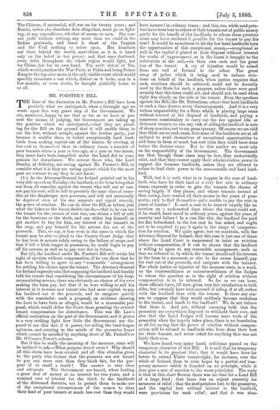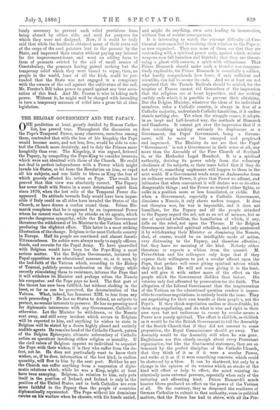MR FORSTER'S BILL. T HE lines of the discussion on Mr.
Forster's Bill have been precisely what we anticipated, when a fortnight ago we wrote upon this very grave step of the Government. We are, moreover, happy to see that so far as we have at pre- sent the means of judging, the Government are taking up the position which we anticipated,--that they are plead- ing for the Bill on the ground that it will enable them to use the law, without scruple, against the lawless party, just because it enables them to forbid exceptionally hard land- lords from making capital out of the famine by ejecting, at less cost to themselves than in ordinary times, a number of poor tenants whom a year or two ago, or a year or two hence, they must have been compelled under the Land Act to com- pensate for disturbance. We entreat those who, like Lord Stanley of Alderley, are raving against Mr. Forster's Bill, to consider what it is they are raving against, which for the most part we venture to say they do not know.
(1.) As the Attorney-General for Ireland pointed out in his very able speech on Tuesday, the landlord, so far from being shut out from all remedies against the tenant who will not or can- not pay his rent, will be left to precisely the same class of reme- dies as the shopkeeper now possesses, and will not necessarily be deprived even of his one separate and signal remedy, the power of eviction. He can do after the Bill, as before, just what the baker or the bacon-dealer can do,—that is, he can sue the tenant for the arrears of rent due, can obtain a bill of sale for the furniture or the stock, and can either buy himself, or get another to buy for him, any interest of the tenant's in the crop, and pay himself for the arrears due out of the proceeds. This, we say, is true even in the cases in which the tenant may be able to plead to the County Court Judge that he has been in arrears solely owing to the failure of crops, and that if left a little longer in possession, he could begin to pay off his Arrears, as well as to pay rent due in future.
But (2), the landlord under Mr. Forster's Bill will retain his right of ejection without compensation, if he can show that he has been willing to agree to any "reasonable" arrangement for settling his claims upon the tenant. The Attorney-General for Ireland expressly said that supposing the landlord had frankly told his tenant that considering the circumstances of his long- accumulating arrears, there was obviously no chance of his ever making the farm pay, but that if he were willing to sell his interest in it to some new tenant who had more capital, to pay tie landlord out of the proceeds, and to emigrate quietly with the remainder, such a proposal, on evidence showing the facts to have been as alleged, would be a reasonable pro- posal, which would debar the Court from granting the evicted tenant compensation for disturbance. This was Mr. Law's official contention on the part of the Government, and it places in a very striking light how little the Government are dis- posed to use this Act, if it passes, for aiding the land-league agitators, and creating in the minds of the peasantry hopes which cannot be satisfied by anything short of Mr. Parnell's or Mr. O'Connor Power's scheme.
But if this be really the meaning of the measure, some will be inclined to ask,—What purpose does it serve ? Why should all this alarm have been created, and all this stimulus given to the party who declare that the peasants al% not bound to pay any more rent than they think fair, for the pur- pose of so small a result? The answer is very clear and adequate. The Government are bound, when lending a great deal of money at no interest for two years, and a nominal rate of interest for the third, to the landlords of the distressed districts, not to permit them to make use of the exceptional circumstances of the season to clear their land of poor tenants at much less coot than they would have incurred in ordinary times ; and this, too, while seed pota- toes have been lent to others of their tenants out of public money partly for the benefit of the landlords, to whom these potatoes alone may have rendered it possible for the tenant to pay his rent? It would be monstrous to let the few hard landlords turn the opportunities of this exceptional season,—exceptional as well in the capital it placed at their disposal without interest for works of improvement, as in the losses it brought to the cultivators of the soil,—to their own ends and the great
loss of the tenant. A cry of injustice would be raised from one end of Ireland to the other. The great army of police which is being used to enforce evic- tions on behalf of the landlord, when justice requires that such evictions should be enforced, could not be decently used by the State for such a purpose, unless there were good security that this force could not, and should not, be used when right was clearly on the side of the tenant. Even the speakers against the Bill, like Mr. Tottenham, admit that hard landlords at such a time deserve every discouragement. And it is a very serious responsibility for a State which is placing large sums without interest at the disposal of landlords, and paying a numerous constabulary to carry out the law against idle or dishonest tenants, to run any risk of aiding the landlord in acts of sharp practice, not to say gross tyranny. Of course we are told that there are no such cases, that none Of the landlords are at all inclined to avail themselves of exceptional opportunities to add farm to farm at much less cost than they could have done before the distress came. But in this matter we must rely on the responsibility of the Government. The Government say that though these cases may be few, they undoubtedly exist, and that they cannot apply their administrative power to support the humane landlords, unless they are allowed to refuse to lend their power to the unreasonable and hard land- lord.
Well, but it is said, what is to happen in the case of land- lords who have let their land at a very low rate in ordinary times, expressly in order to give the tenants the chance of saving largely if they please, and whose tenants, instead of thus saving, have wasted all their means in the years of pros- perity, only to find themselves quite unable to pay the rent in years of famine ? Is such a case to be treated exactly like an eviction on a rack-rented farm where the tenant could not, if he would, have saved in ordinary years, against the years of scarcity and failure ? In a ease like this, the landlord has paid his fine beforehand, in the low rent he has asked, and ought not to be required to pay it again in the shape of compensa- tion for eviction. We quite agree ; but we maintain, with the Attorney-General for Ireland, that this case is just one of those where the Land Court is empowered to insist on eviction without compensation, if it can be shown that the landlord is willing to agree to any reasonable arrangement, such as that we referred to, by which the tenant should sell his interest in the farm to a successor, or else to the owner himself, pay his rent out of the proceeds, and emigrate with the balance. The whole justice or injustice of the measure rests, in a word, on the trustworthiness or untrustworthiness of the Judges to whom the question as to the right of eviction without compensation is to be referred. So far as we can hear, these officials have, till now, given very fair satisfaction to both sides, but certainly have been accused of siding, if at all, rather with the landlord than with the tenant. Is there any rea- son to suppose that they would suddenly become credulous to the tenant, and harsh to the landlord? We do not believe that there is. And yet, without assuming both that the peasantry are everywhere disposed to withhold their rent, and also that the Land Judges will become mere tools of the peasantry when the inquiry takes place, there is no foundation at all for saying that the power of eviction without compen- sation will be refused to landlords who have done their best for their tenants, and never asked for anything that was not fairly their own.
We have heard very many harsh criticisms passed on the temporary character of this Bill. It is said that its temporary character is its greatest blot ; that it would have been far better to extend Ulster tenant-right, for instance, over the whole of Ireland, than to raise hopes by a partial and tem- porary measure which is founded on no principle, while it does give a sort of sanction to the worst principles. The reply is that in this short Session there was no time for a Land Bill of a large kind ; that there was an urgent necessity for measures of relief ; that the seed potatoes lent to the peasantry, and the capital lent without interest to the landlord, were provisions for such relief ; and that it was abso-.
lutely necessary to prevent such relief provisions from being abused by either side, and used for purposes for which they were not designed. Now, if it could be truly said that while the landlords obtained many of their rents out of the crops of the seed potatoes lent to the peasant by the State, and improved their estates without paying any interest for the improvement-loans, and went on adding farm to farm of peasants evicted by the aid of small armies of Constabulary, the peasants having gained nothing but the temporary relief which they were bound to repay, then, no people in the world, least of all the Irish, could be per- suaded that the State was not engaged in a conspiracy with the owners of the soil against the cultivators of the soil. Mr. Forster's Bill takes power to guard against any true accu- sation of this kind. And Mr. Forster is wise in taking such power. Without it, he might well be charged with intending to turn a temporary measure of relief into a gross bit of class legislation.



































 Previous page
Previous page